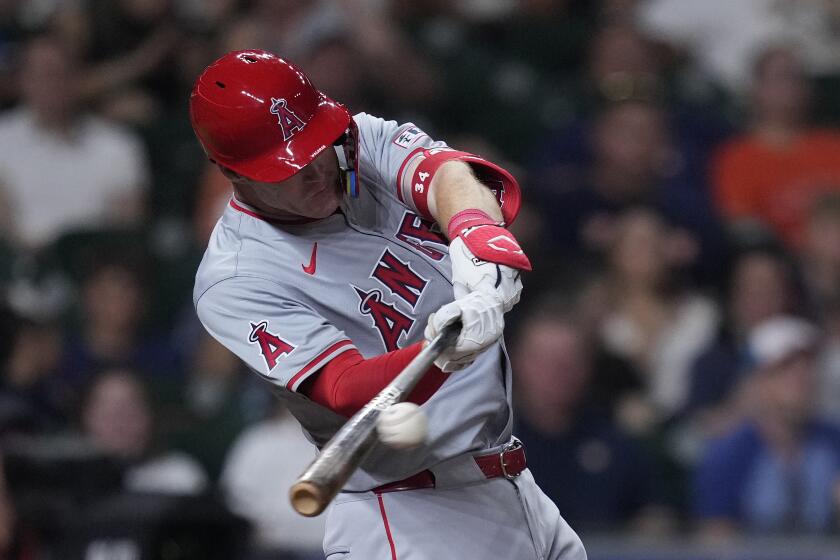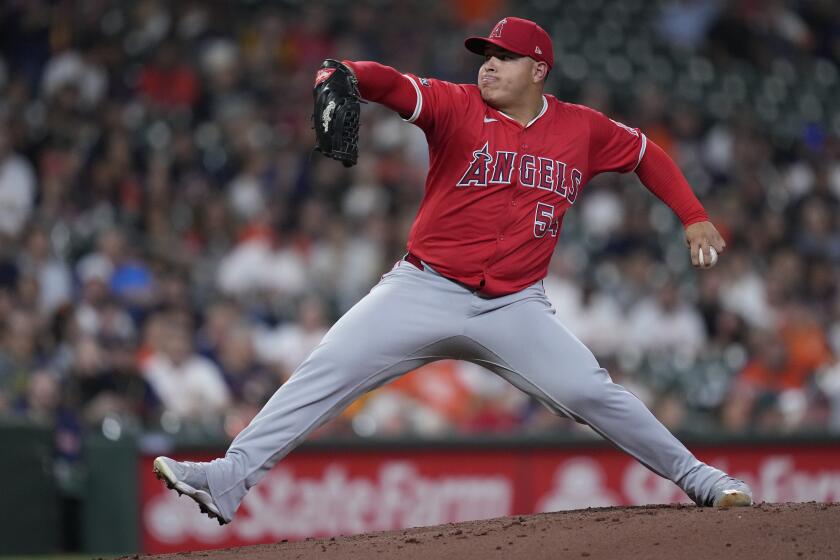The Great Steroids Debate: What’s Arte Moreno’s Next Move?
The biggest free agent signing this offseason by the Los Angeles Angels of Anaheim was a five-year, $50 million contract handed out to 32-year-old center fielder Gary Matthews, Jr. But at the end of February, reports surfaced that Matthews’ name came up in raids on pharmacies that distribute performance-enhancing drugs, specifically the synthetic hormone Genotropin, which was reportedly ordered by Matthews and sent to a friend’s house. This week Halos Heaven proprietor Mat Gleason and New York Sun baseball writer Tim Marchman will debate the Matthews case and the issue of steroids in baseball, starting with today’s question: What can, what should, and what *will* Arte Moreno do about Gary Matthews Jr.?
Daddy, are the Angels tainted?
By Mat Gleason
In January of 2004, Arte Moreno announced that he was changing his team’s name, despite contract language that appeared to forbid it. Few gave him any chance to succeed. But his team is now officially called the Los Angeles Angels of Anaheim.
Fast forward to today. Gary Matthews Jr. is becoming a pariah outside the Angels’ clubhouse. Talk is surfacing about the negative effect Matthews is having on the Angels “brand.” A legal case for Moreno could be forming in the loopholes of the General Agreement between baseball and its union.
What should he do? Moreno should keep the pressure on Matthews at the very least. In the past few weeks Angels management has requested that Matthews address the issues surrounding leaks to the media that he was on the receiving end of a 2004 shipment of Human Growth Hormone. Using different organization faces, the Angels have pleaded (team spokesman Tim Mead), cajoled (General Manager Bill Stoneman), and gruffly demanded (Moreno himself) that Matthews publicly confront these allegations. Under advice from his attorney, Matthews has declined. Continued pressure affirms the Angels’ commitment to the integrity of the game of baseball. If Matthews were to shine this season and lead the Angels to a division title (or more) without addressing the ambiguities of this situation, there would forever be a tainted flag flying over the Thunder Mountain Fountain behind Angel Stadium’s centerfield wall.
Imagine the conversation between father and son years from now:
“Daddy, when they won that year, was it with the guy on steroids?”
“Yes son.”
(Child points to any of the other flags in the outfield). “Daddy, which Angels were on steroids when they won in those years?”
If the reputation of your company was at stake with its current and future customer base, would you be employing every tactic to try to defuse the situation?
What will Arte Moreno do? By equating association with illegal and/or banned substances as an issue of corporate branding, Angel management is setting up a new paradigm whereby egregious employee behavior is addressed outside the context of civil rights and in terms of economic impact. The interpretation of certain morals clauses in the General Agreement could bypass notions of player privacy and get to the heart of the matter: Baseball is for the fans to have heroes. Cheaters associated with a particular franchise diminish the market value of the team. The goal must be to affirm that player improprieties are grounds for terminating previously guaranteed contracts -- I believe Arte Moreno is the one man best positioned to stand up against the madness that is the glory-hog greed of Performance Enhancing Drug users masquerading as civil rights marchers.
Punishing a juicer for tarnishing his halo doesn’t sound as absurd as “Los Angeles Angels of Anaheim” did three years ago. Just because baseball has not been able to do it does not mean Arte Moreno won’t be able to.
Mat Gleason is the publisher of Coagula Art Journal. As “RevHalofan” he blogs daily about the Angels at Halos Heaven.
Dream on, Arte
By Tim Marchman
Arte Moreno is a great owner. I wish there were 29 more like him. Any ideas about tying Gary Matthews, Jr. to morals clauses or the value of the Angels brand, though, are coming from legal minds of the same quality as the baseball minds that convinced Moreno to pay Matthews $50 million to be the Angels’ fifth-best option in the outfield.
The morals clause in section 7.(b) of the Uniform Player Contract is unenforceable. It says that a team can terminate a contract if a player should “fail, refuse or neglect to conform his personal conduct to the standards of good citizenship.” The Rockies couldn’t use this clause to get rid of washed-up pitcher Denny Neagle after he was caught soliciting a prostitute. The chances of the Angels being able to use it to get out of Matthews’s contract because someone told Sports Illustrated he bought prescription drugs on the Internet while playing for another team are roughly the same as my chances of pitching for the Mets this year.
So the question of what Moreno will do is easy to answer: He won’t do anything, because there’s nothing he can do, and that will hold even if photos surface of Matthews grinning and giving a thumbs-up while injecting himself with a big needle marked “This is HGH for which I got a shady prescription from a quack doctor.” There’s a legal framework within which ballplayers can face penalties from the game for using drugs, and that framework doesn’t give Moreno the power to do anything, in this instance, except huff and moan about the unfairness of life. If he doesn’t like it, he can lobby his other owners to try and get the players to agree to change the legal structure of the game during the next labor negotiations. I’ll pitch a perfect game for the Mets before that happens.
This doesn’t mean that Moreno doesn’t have options. He can always cut Matthews a check for $50 million and tell him to get lost. That would show that Moreno takes accusations of sketchy but probably legal behavior made in Sports Illustrated really and truly seriously. The day an owner does that is the day I’ll believe there’s one owner who’s really and truly serious about making sure he doesn’t have anyone on his team about whom vaguely unpleasant things are written in the press. Until then I’ll be forced, with sadness and regret, to take the way they spend their money as being the best evidence of their supposed umbrage and outrage over the wicked scourge that is the off-label use of prescription drugs.
Best of all, of course, Moreno could man up and stick by his player. Matthews hasn’t even been accused of doing anything illegal, but rather of getting a drug for which he had a prescription (a drug that wasn’t even banned by baseball at the time) mailed to a former teammate. If you find the accusations credible and don’t think ballplayers should be injecting stuff meant to help children with pituitary disorders, boo him out of the yard by all means. That’s your right as a fan. Moreno, though, isn’t a fan, but someone who’s willingly entered into a variety of legal agreements with Matthews. He ought to keep them in mind.
Tim Marchman writes about baseball for the New York Sun. His performance is enhanced by Pogues records.
More to Read
Go beyond the scoreboard
Get the latest on L.A.'s teams in the daily Sports Report newsletter.
You may occasionally receive promotional content from the Los Angeles Times.





